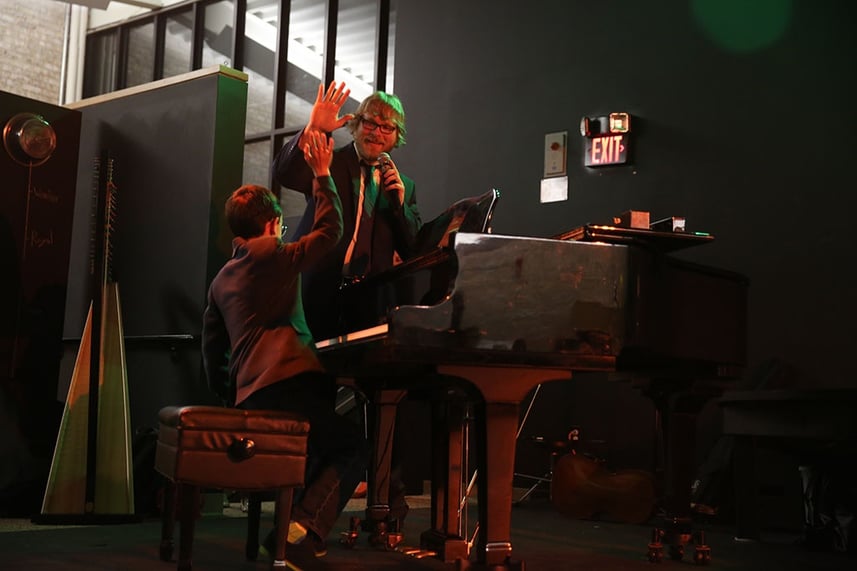If you ask Upper School Music Teacher Drew Vandewinckel what he thinks about music, he'll tell you it can be anything you make of it. It can be a fun hobby used to pass the time, an important form of expression to get through a tough situation, or if you're like Drew, it can be the driving force in your life.
While Mr. Vandewinckel — as students know him by — is a teacher at Whitby School, he's also a working musician who plays as many gigs as he can while balancing that with teaching. As he hones his craft as a musician, he's also honing himself as a teacher.
Given his experience as a musician in New York City, Vandewinckel meets many musicians with different styles and backgrounds who have different ways of making music. He's come to realize that 60 to 75 percent of the music he plays is through a head arrangement — or a musical arrangement that's not written down, similar to how a band at a live concert doesn't use sheet music. This has led Vandewinckel to teach music with a central focus on developing aural skills in lieu of sheet music and method books.
"While I think reading music is a really important skill and something I still encourage people to do, I think learning aurally is especially good for students that aren't necessarily trying to go into music professionally but have an interest in it and want to have it be part of their life," says Vandewinckel. "It's a really accessible way for them to get involved."
Not only is it accessible, but it's effective in fostering and maintaining interest in learning and improving as a musician. Teachers at Whitby often talk about inquiry based learning and how it's important to motivate students to ask questions they're legitimately curious about while giving them the tools to find the answers to those questions.
Sometimes the examples are more obvious than others, such as 4th Grade Exhibition or the 6th Grade Instrument Design Unit. In the case of music, the inquiry comes from having the aural skills to know what an existing piece of music is supposed to sound like, or having a desired sound in mind of what you'd like to achieve. With that knowledge of sound, the desire to improve technically as a musician increases.
"I think the more that you have an aural understanding — a more organic way of approaching music — then learning the information becomes much easier because you're learning the information because you're seeking it out," Vandewinckel says.
He adds that music was originally written down simply as a way to record it before audio recorders were invented. However, instruction at the time was based on listening in a master-apprentice-type relationship. This kind of instruction is something Vandewinckel pursues in his teaching. "If you can hear the sound and see what a person is doing to make that sound, then you can do that yourself," he says.

During a recent Cafe Night (a school open mic for musicians and dance acts), he recruited a violin student of his to accompany a student guitarist on piano. The violin player had never played piano before but Vandewinckel played two chords for her to listen to and showed her the finger placements for both. The student could instantly play the chords, while Vandewinckel says it would have been a much longer process had she learned from written notes.
For anyone interested in getting into music, Vandewinckel is quick to say that music is a huge world but urges them not to be intimidated. For his students, he eliminates intimidation and makes music approachable, accessible and rewarding, while inspiring a genuine interest in learning with his students as they learn about sound and the tools they need to achieve it.
"Through music I've built some of the most deep relationships that I've had with people and through that I've found out who I am and found out what makes me tick," he says. "To actually do something that is a trip of self-discovery for myself that also hopefully brings joy to other people is a really beautiful thing."


